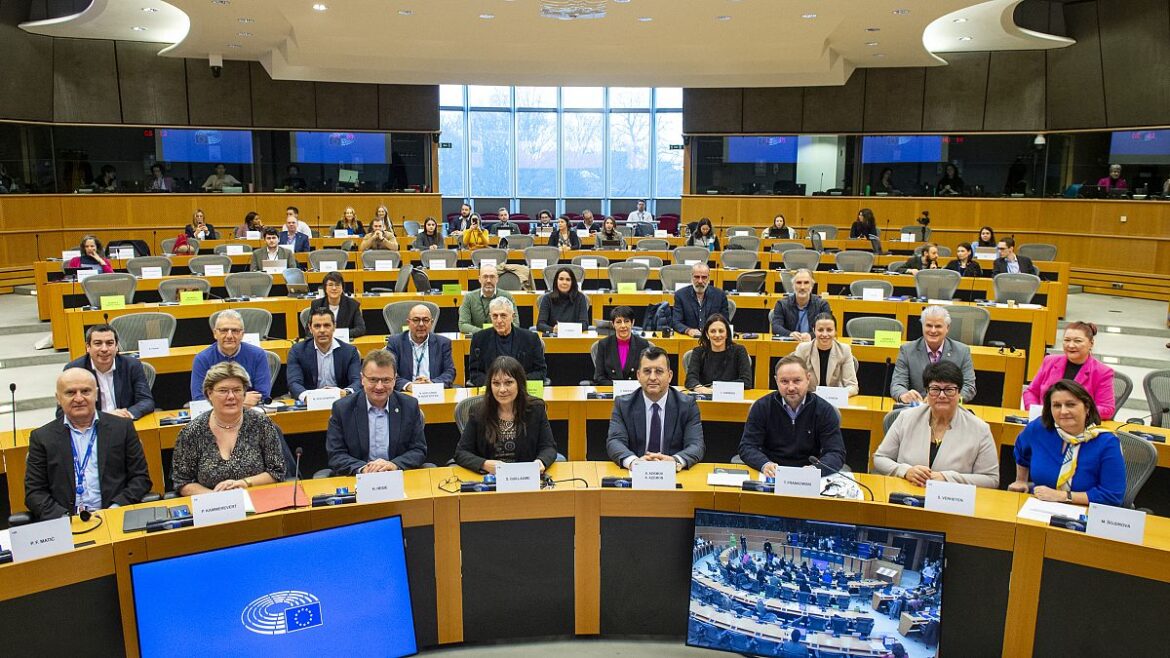The group led by National Rally’s Jordan Bardella is vying for the chairmanship of the Committee on Culture and Education. Why, and what impact could this have on EU cultural policies?
MEPs will vote Tuesday on the chairmanship of parliamentary committees, with the far-right Patriots for Europe seeking to lead the body’s culture committee — a move which may well be blocked but could offer radicals opportunities to highlight some extreme policy positions.
Members of the European Parliament’s CULT committee oversee files related to education policy — such as Erasmus programmes, which enable students to study in different member states — media and audiovisual policies (through the Media Freedom Act), the budget of cultural funding programmes (Creative Europe), and are also active in citizens’ outreach activities such as the European Capital of Culture or the Lux Prize, the European film awards.
“These programmes that build intercultural skills and tolerance, boost support and trust in the European Union, and foster a European identity are too important to be left in the hands of self-proclaimed Eurosceptics,” according to a statement by the European Youth Forum, a youth representation NGO.
How influential is the committee chair?
The role of the chair is particularly important. As the main personality of the committee, the chair has administrative prerogatives: organising meetings, setting the agenda, and allotting debating time to members. The chair also decides on the live broadcasting of committee debates and access for reporters.
It is also a symbolic position, as the chair represents the committee to other European institutions and during meetings with parliaments abroad.
The chair also has a seat at the table of the Conference of Committee Chairs, the political body of the European Parliament that coordinates the work of the committees and ensures smooth cooperation between them. This body resolves conflicts over which committees have competence for dossiers that touch on multiple sectors.
Parliamentary committees are primarily where texts are drafted and agreed upon before being presented for a vote in plenary sessions to become the position of the European Parliament. Pro-European forces (Greens, S&D, Renew, and EPP) hold a majority in this committee — 19 MEPs out of 30.
An alliance of these forces in the committee could theoretically override the position of the four Patriot MEPs. However, CULT is a particularly small committee that is prone to member abstention.
What files are expected for the next mandate?
The biggest dossier of the previous legislature was the European Media Freedom Act, legislation designed to guarantee the transparency and independence of media in Europe. This mandate will partly be dedicated to its implementation and monitoring.
«Allowing the Patriots to chair this crucial group would send out the message that it is acceptable to undermine media freedom principles,» Pamela Morinière, the head of communications of the International Federation of Journalists, told Euronews of her fears for the Patriots chairing the committee.
A new revision of the EU’s Audiovisual Media Services Directive (AVMSD) should also be discussed in the committee. This directive aims to control broadcast content, from content judged harmful to children to advertisements.
Other files planned include the revision of the Erasmus+ budget, the Lux Audience Awards, and more general reports on education and the identity of Europeans.
While most candidates for chairmanships are likely to be accepted tomorrow as a result of the broad centrist coalition of the Parliament, it seems unlikely that the newly formed Patriots — shunned with a cordon sanitaire by the other parties — will succeed in seizing leadership of the committee.
Parliamentary sources told Euronews that if the Patriots’ mission failed, the committee might revert to the Greens, most likely to the German MEP from the Volt party, Nela Riehl.
But the Parliament is no stranger to surprises, and the CULT committee in the hands of the Patriots would certainly rock the boat.
Check who’s who in the European Parliament’s new committee roster here.

